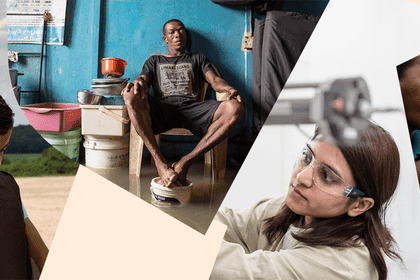
Why we influence policy
To achieve our mission, we need governments and policymakers to take action. Creating the conditions for change is critical to ensuring science and research thrive and policies meet the needs of affected people and communities.
We use our independence to advocate for research to unlock discovery and solutions in health, translate evidence into policy recommendations, build public support for action and remove barriers to the implementation of solutions.
As a global foundation, we convene policymakers, researchers, and civil society worldwide to foster dialogue and collaboration across sectors to address shared health challenges.
Policy areas we work in
We advocate for advancements that support research and improve health across Discovery Research, Climate and Health, Infectious Disease and Mental Health. This includes cross-cutting issues that provide a foundation for progress, such as global health financing.
Wellcome Policy Lab provides a space to experiment with creative approaches to the policy processes we use and the products we create.
Examples of our work:
Our impact
Our advocacy work has directly impacted health, from improving how the world prepares for and responds to pandemics, to supporting UK research to thrive through association to Horizon Europe.
Our work with partners informs policy and practice – for example, supporting Africa Centres for Disease Control and Prevention (Africa CDC) to develop and implement a leadership programme to train policymakers on mental health.
UK in Europe
We worked with EU institutions, the UK government, the research sector and others to achieve an outcome from the post-Brexit negotiations that allows research to thrive in the UK and Europe. This included ensuring the UK rejoined Horizon Europe, the world's largest research collaboration programme.
Climate and Health
We make the case for governments to take physical and mental health into account in climate policy and decision-making. Our work with partners at COP28 supported the growth of the climate and health movement and raised the political profile of health amongst the climate community. This resulted in the first COP Health Day, where health ministers from over 120 countries endorsed the Climate and Health declaration”.
Future of Global Health Initiatives (FGHI)
We facilitated the FGHI process to bring together governments, global and regional health organisations, research institutions and civil society to mobilise action for a more equitable and effective global health architecture. This culminated in the launch of the Lusaka Agenda.
Reports and briefings
Our policy reports provide evidence on key health issues and make the case for change informed by science and the communities most affected.
We also produce briefings and responses to consultations.
Our team
Policy

Paul Spencer
Head of Policy, Mental Health
Wellcome
Government Relations and Strategic Partnerships

Megan Challis
Associate Director, Government Relations and Strategic Partnerships
Wellcome

Silaja Birks
Head of Strategic Partnerships
Wellcome

Diana Peters
Head of European Government Relations
Wellcome

Alison Stiby Harris
Head of Government Relations
Wellcome
Connect with Alison:










